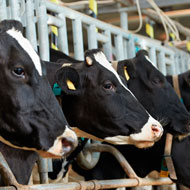Milk price cuts "could be very serious" long-term

The NFU is concerned that milk price cuts could be damaging long-term for the whole sector.
As falling milk prices have led to a series of recent protests by dairy farmers, the chairman of the National Farmer's Union's (NFU) dairy board is urging retailers, processors and policy-makers to protect the British dairy farming industry.
"The current global situation has led to a crisis for many British dairy farmers," said Mr Harrison. "Many are selling milk at well below the cost of production."
Last week Iceland became the latest retailer to cut milk prices. Mr Harrison said selling milk too cheaply "devalues the product in the eyes of consumers." He fears this will be damaging to the sector in the long run.
"While some retailers have made great strides forward to create clear and fair formulas in how they pay their dairy farmers, we are concerned that the long term impact of extremely low retail milk prices on the industry could be very serious for all concerned."
While the price cuts are resulting in a good deal for consumers, Mr Harrison said to retailers: "You must promise to ensure you fund those deals from your own profit margins and not take it from the pockets of farmers." Although some retailers have already promised this, "we need that promise from them all".
He is calling for UK and EU policy-makers to pull together to ensure dairy farmers can weather the storm. He says he will continue to meet with those policy-makers to determine what interventions can be employed and to continue work on the voluntary code that helps to ensure fairness between processors and suppliers.



 The Veterinary Medicines Directorate (VMD) is inviting applications from veterinary students to attend a one-week extramural studies (EMS) placement in July 2026.
The Veterinary Medicines Directorate (VMD) is inviting applications from veterinary students to attend a one-week extramural studies (EMS) placement in July 2026.